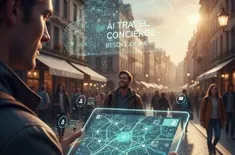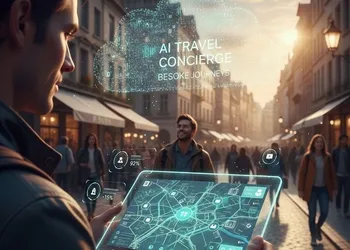Learn how IoT in hospitality and AI operations enable smart hotel management for maintenance anticipation.
The world of luxury hospitality is fundamentally defined by the delivery of a flawless guest experience. In this elite sector, a guest’s expectation is not merely for comfort and convenience, but for an experience characterized by absolute seamlessness, where every detail operates with invisible perfection. A flickering light, a slow elevator, or a malfunctioning thermostat is not a minor inconvenience—it is a catastrophic failure of the service promise. To uphold this standard, luxury hotels are rapidly pivoting from reactive and time-based maintenance models to a data-driven, preemptive strategy powered by technology: Predictive maintenance.
This revolutionary approach, which seamlessly integrates IoT in hospitality with advanced AI operations, is transforming how hotel infrastructure is managed. It shifts the maintenance paradigm from fixing things after they break to maintenance anticipation—identifying and neutralizing potential issues before they ever manifest into a problem that impacts a guest’s stay. This technological pivot is the core of true smart hotel management, turning a historical cost center into a strategic differentiator.
The Flaw in the Old Model: Why Reactive Maintenance Fails Luxury
Traditional maintenance strategies fall into two main categories, both of which are incompatible with the high-stakes environment of luxury hospitality:
- Reactive Maintenance (Run-to-Failure): Waiting until a component fails completely. In a luxury setting, this means a broken elevator, a flooded bathroom, or a non-functional HVAC system—all leading directly to guest complaints, service recovery costs, negative reviews, and a permanent erosion of brand trust.
- Preventive Maintenance (Time-Based): Fixing or replacing equipment on a fixed schedule (e.g., servicing the chiller every six months). While better than reactive, this model is inherently inefficient. It results in maintenance being performed too often (wasting resources and staff time) or, critically, too late (because a part failed prematurely due to unmonitored stress).
The fundamental flaw is that neither system guarantees the flawless guest experience. Luxury mandates a system that is invisible, proactive, and predictive, ensuring a state of continuous operational perfection.
The Tech Foundation: IoT Sensors and AI in Hospitality
The shift to Predictive maintenance is built upon a dual-pillar technological infrastructure: the Internet of Things (IoT) and Artificial Intelligence (AI).
The IoT Sensory Network: Data Acquisition
IoT in hospitality refers to the deployment of small, interconnected sensors embedded within critical infrastructure. These sensors continuously collect real-time data on the operational health of assets, transforming a static building into a dynamic, data-generating ecosystem.
- HVAC Systems: Sensors are placed on compressors, motors, fans, and coils to measure vibration, temperature, energy consumption, and pressure. A slight increase in vibration, for example, might indicate bearing wear days or weeks before a catastrophic motor failure.
- Elevators and Escalators: Vibration and current draw sensors monitor the hoist motors, sheaves, and ropes. An unusual fluctuation can signal a misalignment or an impending motor failure, allowing repairs to be scheduled during low-occupancy hours, preventing frustrating downtime.
- Room Controls and Utility Systems: Temperature, humidity, and flow sensors track the performance of individual room thermostats, hot water circulation pumps, and lighting circuits. A gradual but consistent decline in a room's cooling efficiency, for example, can be flagged long before the guest finds the room uncomfortably warm.
- Kitchen and Laundry Equipment: High-end, commercial-grade equipment is monitored for thermal output and power consumption, anticipating failure in critical, high-impact areas like walk-in freezers or industrial washers.
The AI Operations Core: Predictive Analytics
The sheer volume of data streamed from thousands of IoT sensors across a large luxury property is far too vast and complex for human analysis. This is where the power of AI operations comes into play.
The AI system ingests the raw, real-time data and employs sophisticated Machine Learning (ML) models to:
- Establish Baseline Norms: The AI first learns the 'normal' operational signature for every asset. This baseline accounts for variables like time of day, seasonal changes, and occupancy rates (e.g., an HVAC unit runs differently in July than in January, and differently at noon than at 3 AM).
- Identify Anomalies: The system constantly monitors incoming data for subtle deviations from the established baseline. These are not failures, but precursor signals of a potential issue. For instance, if the vibration on an exhaust fan motor increases by 5% over three days, that’s a significant anomaly.
- Predict Failure: Using its trained models, the AI correlates these anomalies with historical failure data to calculate the Probability of Failure and the estimated Time-to-Failure (TTF) for the specific component. This is the essence of Predictive maintenance.
- Generate a Proactive Work Order: Instead of waiting for a guest complaint, the AI automatically generates a maintenance ticket, complete with the predicted issue (e.g., "Elevator Motor #3: Bearing failure predicted in 14 days, prioritize replacement"), directly informing the facilities team.
This intelligent workflow enables genuine maintenance anticipation, giving staff the power to solve problems invisibly and prevent operational downtime.
Operational Impact: Smart Hotel Management in Practice
The implementation of Predictive maintenance fundamentally elevates the entire operation, resulting in significant cost savings, extended asset life, and, most importantly, a guaranteed flawless guest experience.
Ensuring the Flawless Guest Experience
For luxury hotels, the return on investment (ROI) is not just in cost savings, but in preserving the integrity of the guest stay:
- Invisible Repairs: Issues are fixed before the guest ever notices them. The HVAC unit that was predicted to fail is serviced while the room is temporarily vacant between check-outs, ensuring the next guest enters a perfectly climate-controlled sanctuary.
- Elevated Comfort: Smart hotel management uses the predictive insights to maintain optimal environmental conditions. The AI doesn't just prevent failure; it ensures the system runs at peak efficiency, guaranteeing precise temperature and humidity control, which is a hallmark of true luxury.
- Zero Downtime: Critical systems like power, water, and vertical transportation are monitored with the highest priority. Avoiding a single day of elevator downtime in a busy luxury tower can save hundreds of thousands in lost business, service recovery, and reputational damage.
Driving Efficiency and Sustainability
Beyond guest satisfaction, AI operations for maintenance deliver tangible business advantages:
- Cost Reduction: McKinsey reports that Predictive maintenance can reduce maintenance costs by 20-30% and cut equipment downtime by up to 50%. By replacing parts based on their actual condition rather than a calendar date, hotels save on unnecessary component purchases and the five-times higher cost of emergency repairs.
- Asset Lifecycle Extension: Timely, minor repairs prevent small issues from cascading into major system failures. By optimizing the operational health of expensive assets like industrial-sized chillers, boilers, and generators, hotels can significantly extend the lifespan of this multi-million dollar equipment.
- Energy Optimization: IoT sensors provide granular data on energy consumption. The AI can identify ‘energy anomalies’—equipment using more power than its baseline norm—which often signals an impending mechanical fault (e.g., a motor struggling due to friction). Fixing this inefficiency not only prevents failure but also immediately reduces utility costs, contributing to sustainability goals.
The Future of Luxury Hospitality: A Proactive Ecosystem
The integration of Predictive maintenance, IoT in hospitality, and AI operations represents more than just a maintenance upgrade; it is the evolution of smart hotel management into a genuinely proactive ecosystem. This system doesn't just wait for information; it actively anticipates, predicts, and resolves issues, making the facilities and maintenance team an invisible yet essential partner in delivering the flawless guest experience.
In a competitive landscape where reputation is everything, the ability to guarantee operational perfection through maintenance anticipation is the new standard of luxury. Hotels that embrace this AI-driven approach will not only achieve superior efficiency and cost savings but will solidify their status as industry leaders, where every stay is defined by unparalleled reliability and comfort. The era of the broken air conditioner and the out-of-service elevator is swiftly ending, replaced by a promise of invisible operational excellence, powered by data.



































